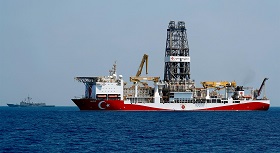Since 2011, Eastern Mediterranean affairs have mainly been marked by instability due to the civil wars in Libya and Syria. Recently, a new source of tensions further perplexes the situation—the Greek-Turkish standoff. Currently, Athens and Ankara disagree over sovereign rights in the Eastern Mediterranean. Specifically, they both claim rights in maritime zones which have not yet been delimited. The nature of the problem is not new, dating back to November 1973. What is new is the breadth of maritime zones the two sides disagree upon. The attention has shifted towards the Eastern Mediterranean in the last ten years, while it had only focused on the Aegean Sea before energy discoveries were made in the Levantine Basin in 2009.
Greek-Turkish relations were relatively calm from 1999 until 2016. In 2002, Athens and Ankara launched the so-called “exploratory talks,” a format to exchange views on thorny issues informally. The 60th round of bilateral exploratory talks took place in March 2016 and was the last until now. After 2016, cooperation between Greece and Turkey continued—for example, on the management of the refugee crisis—but the latter employed a different foreign policy approach. Seeing the EU door almost closed and having to deal with the post-coup domestic priorities, President Tayyip Erdogan sought to strengthen his country's regional role. He placed more emphasis on national security issues and was not hesitant to forge closer ties with Russia and China. He has lacked predictability in international affairs.
Another reason for pessimism is that Turkey complements its position about a future dialogue with Greece with some proposals on the island of Cyprus. Specifically, Foreign Minister Mevlut Cavusoglu has talked about the establishment of an equitable revenue sharing mechanism and other schemes with the participation of all parties, including the Turkish Cypriots. Whether the two themes, Greek-Turkish relations and the rights of Turkish Cypriot and perhaps a revival of talks on the Cyprus Question are to be linked, will be seen. As a matter of principle, Athens and Nicosia do not accept the participation of the Turkish Cypriot administration in any negotiations or meetings. And they both see the Cyprus Question as an international and European problem. Having said that, Greece and Cyprus raise provocative Turkish actions in the Eastern Mediterranean at the EU level, whereas Turkey prefers direct negotiations on outstanding issues. Despite this alignment, Athens does not negotiate on behalf of Nicosia.
So, where are we? NATO “deconfliction” talks are continuing and Germany is pushing both Greece and Turkey to engage themselves in new exploratory talks. The most delicate part of the task is not to talk about the need for dialogue but to make dialogue a success before a new military crisis occurs. Russia has also offered to mediate if asked, as the problem is an area of concern for the American administration and NATO first. From a Greek perspective, good ties between Russia and Turkey are a thorn in Foreign Minister Sergey Lavrov's initiative to mediate. Of course, this can also be a blessing in disguise. Prime Minister Kyriakos Mitsotakis decided to publicize his interest in holding a telephone conversation with President Vladimir Putin at the end of July, while important meetings between Greek and Russian officials took place in recent days. Foreign Ministers Dendias and Lavrov regularly talk to each other. Greece strives to achieve balance between its clear foreign policy choices and the difficult but possible rewarming of ties with Russia, acknowledging the rising role of the latter in the South.
Since 2011, Eastern Mediterranean affairs have mainly been marked by instability due to the civil wars in Libya and Syria. Recently, a new source of tensions further perplexes the situation—the Greek-Turkish standoff. Currently, Athens and Ankara disagree over sovereign rights in the Eastern Mediterranean. Specifically, they both claim rights in maritime zones which have not yet been delimited. The nature of the problem is not new, dating back to November 1973. What is new is the breadth of maritime zones the two sides disagree upon. The attention has shifted towards the Eastern Mediterranean in the last ten years, while it had only focused on the Aegean Sea before energy discoveries were made in the Levantine Basin in 2009.
Greek-Turkish relations were relatively calm from 1999 until 2016. In 2002, Athens and Ankara launched the so-called “exploratory talks,” a format to exchange views on thorny issues informally. The 60th round of bilateral exploratory talks took place in March 2016 and was the last until now. After 2016, cooperation between Greece and Turkey continued—for example, on the management of the refugee crisis—but the latter employed a different foreign policy approach. Seeing the EU door almost closed and having to deal with the post-coup domestic priorities, President Tayyip Erdogan sought to strengthen his country's regional role. He placed more emphasis on national security issues and was not hesitant to forge closer ties with Russia and China. He has lacked predictability in international affairs.
Eastern Mediterranean waters could not but come to Turkey’s interest when hydrocarbons were discovered in the Basin. Cyprus followed Israel in proceeding to explore and exploit some reservoirs, such as the Aphrodite field, in close collaboration with some international energy companies. Like any other sovereign country in the world with resources, it had the right to develop them. The Republic of Cyprus had already entered the EU in 2004, but the island remained divided after the Turkish military invasion of 1974. From the very beginning, Turkey disagreed with the practices of the Cypriot government and acted to protect, in its view, the Turkish Cypriot community. Such actions became bolder in 2018. Turkish vessels began researching and drilling in Cypriot waters, although the exclusive economic zone of Cyprus is grounded on international law. The reaction of both the EU and the U.S. was very mild. As a result, Turkish ships uninterruptedly continue their operations as of today. Having been disappointed with the EU's stance, on September 21, 2020, Cyprus decided not to sign the list of European sanctions against Belarus unless Brussels moves to impose sanctions on Turkey over its violation of Cypriot sovereign rights in the Eastern Mediterranean.
August 2020 saw Turkey expand the same policy in regard to Cypriot waters, particularly maritime zones south of the island of Kastellorizo. The Turkish government sent the “Oruc Reis” ship to conduct research in disputed waters, according to the terminology of the American administration. It was accompanied by frigates causing Greece’s similar reaction. The research lasted for more than four weeks. On September 21, Ankara did not renew the relevant NAVTEX fueling speculation about its motivations. While maintenance reasons are officially presented as the main reason for the return of “Orus Reis” to the Antalya port, the decision is generally seen as a sign to diffuse tensions in view of the EU-Turkey summit of September 24–25, where the possibility of sanctions is likely to de discussed. Nonetheless, Turkey has declared the vessel could soon continue its mission.
The crisis is far from over. External mediators, namely Germany and the U.S., call for dialogue. Other partners such as Russia, China, France and the UK also advocate for a diplomatic solution. In principle, dialogue remains the only way forward. However, Greece and Turkey have completely different agendas. Turkey opts for negotiations without preconditions on a variety of themes. Experience from history—when the Aegean Sea was the epicentre of attention—shows Ankara is aware that international law would hardly favour its position, should talks only be concentrated on the delimitation of the continental shelf. The Turkish government endeavours to boost its argumentation by publicly talking about the geographic position of Kastellorizo, yet steadily combines other demands along with the proposed arrangement of maritime zones. Greece suspiciously sees this tactic.
Another reason for pessimism is that Turkey complements its position about future dialogue with Greece with some proposals on the island of Cyprus. Specifically, Foreign Minister Mevlut Cavusoglu has talked about the establishment of an equitable revenue sharing mechanism and other schemes with the participation of all parties, including the Turkish Cypriots. Whether the two themes, Greek-Turkish relations and the rights of Turkish Cypriot and perhaps a revival of talks on the Cyprus Question are to be linked, will be seen. As a matter of principle, Athens and Nicosia do not accept the participation of the Turkish Cypriot administration in any negotiations or meetings. And they both see the Cyprus Question as an international and European problem. Having said that, Greece and Cyprus raise provocative Turkish actions in the Eastern Mediterranean at the EU level, whereas Turkey prefers direct negotiations on outstanding issues. Despite this alignment, Athens does not negotiate on behalf of Nicosia.
So, where are we? NATO “deconfliction” talks are continuing and Germany is pushing both Greece and Turkey to engage themselves in new exploratory talks. The most delicate part of the task is not to talk about the need for dialogue but to make dialogue a success before a new military crisis occurs. Russia has also offered to mediate if asked, as the problem is an area of concern for the American administration and NATO first. From a Greek perspective, good ties between Russia and Turkey are a thorn in Foreign Minister Sergey Lavrov's initiative to mediate. Of course, this can also be a blessing in disguise. Prime Minister Kyriakos Mitsotakis decided to publicize his interest in holding a telephone conversation with President Vladimir Putin at the end of July, while important meetings between Greek and Russian officials took place in recent days. Foreign Ministers Dendias and Lavrov regularly talk to each other. Greece strives to achieve balance between its clear foreign policy choices and the difficult but possible rewarming of ties with Russia, acknowledging the rising role of the latter in the South.






